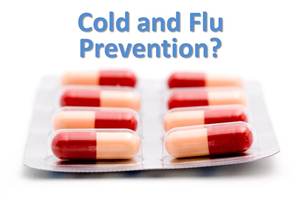 Every pharmacy has a range of products on sale for preventing colds and flu. And every year, people who are hoping to avoid the sore throat, stuffy nose and general achiness buy them. Actually, they buy lots of them–$4.6 billion worth in 2008 alone. But is this money well-spent? Is there any evidence that popular remedies such as Airborne™, Zicam™, vitamin C and Echinacea really work?
Every pharmacy has a range of products on sale for preventing colds and flu. And every year, people who are hoping to avoid the sore throat, stuffy nose and general achiness buy them. Actually, they buy lots of them–$4.6 billion worth in 2008 alone. But is this money well-spent? Is there any evidence that popular remedies such as Airborne™, Zicam™, vitamin C and Echinacea really work?
AIRBORNE
Airborne™ is a dietary supplement marketed to support the immune system. It contains vitamins (A, C and E), minerals (zinc, magnesium, selenium and manganese) and herbs (echinacea and forsythia). While many people use it to try to prevent the onset of colds and/or to shorten their duration, evidence that it actually works is in very short supply. The company that markets the product was forced to settle a court case in 2008 in which it was found guilty of using false advertising without credible scientific evidence to support its claims. Based on the list of ingredients and recommended dosage, there have also been concerns raised about potential vitamin overdose, especially with respect to vitamins A and C.
ZICAM
Zicam™ is a homeopathic remedy for preventing colds that contains zinc acetate and zinc gluconate. It is currently available in tablet, lozenge and throat spray form. A nasal spray was also originally available, but was removed from the market after some users reported damage to their sense of smell. Zinc has been shown to have a significant positive impact on reducing the length and severity of cold symptoms if it is taken within 24 hours of the onset of symptoms. However, whether Zican contains sufficient quantities of the mineral to be effective is open to debate. Homeopathic treatments remain unproven, although many people believe them to be effective.
VITAMIN C
A 1995 review of the effectiveness of vitamin C for preventing cold symptoms found that doses exceeding 50mg daily were effective, but that they only reduced the duration of the virus by 20% on average. Daily doses of 1g are thought to be of greater effectiveness, but little research has been performed to establish this.
ECHINACEA
Echinacea-based products have grown in popularity during the past two decades. Echinacea is an herb that is thought by some to stimulate the immune system, and there is some evidence to support that claim. However, findings are complicated by the use of different species of the plant in research, which has led to conflicting results. At present, the European Medicines Agency (EMEA) suggests that there is sufficient evidence to approve the use of juice extracted from Echinacea to prevent and shorten the duration of colds in those over 12 years old.
SUMMARY
The best advice for people who want to avoid colds and flu is tried and true, and it doesn’t involve a trip to the pharmacist:
- Avoid contact with people with cold and flu symptoms
- Keep your hands away from your nose, mouth and eyes
- Wash your hands regularly
- Don’t share drinking glasses or eating utensils
- Keep surfaces clean
While some over-the-counter remedies may be helpful, common sense and hygiene are still your best bet.














